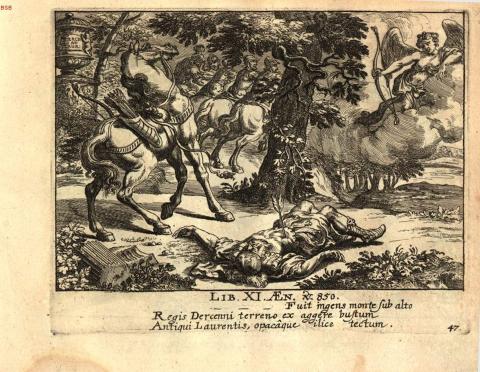CORE VOCABULARY
Trivia, ae, f.: an epithet of Hecate or Diana, whose images were placed at the forks of roads, 6.13, et al. (trivium)
iam: (adv.), at that time, at this time; even then, even now; already, 1.437, et al.; with tum, even, 1.18; w. imperat., at length, at once, 3.41, et al.; soon, presently, immediately, 4.566; then, at length, 1.272; marking a transition, now, 2.567, et al.; iam iam, emphatic, now indeed, 4.371; now, now, 2.530; iam dūdum, iam prīdem, already for some time, long, 1.580, et al.; iam inde, iam ab illō tempore, even from then or that time, 1.623; iam tum, even then; iam — iam, at one time, at another time, now — now; nōn iam, no longer, 4.431; iamdūdum, at once.
Ōpis, is, f.: one of Diana's nymphs, 11.532.
interritus, a, um: (adj.), unaffrighted; dauntless, 5.427; of inanimate things, undisturbed; without peril, secure, 5.863.
furō, uī, 3, n.: to be mad; freq., to rave, be frantic, rage, 1.491; to be furious, burn, storm (for war), 7.625; to be burning or mad with love, 1.659; to be frenzied, in a frenzy, 6.100; inspired, 2.345; distracted with grief, 3.313; plunge madly, 9.552; boil, 7.464; with cognate acc., give vent to one's fury, 12.680.
prōspiciō, spexī, spectus, 3, n. and a.: to look forth, forward; to see afar, in the distance, descry, see, 3.648; to look forth or out upon, w. dat., 1.127. (prō and speciō, look)
mulcō, āvī, ātus, 1, a.: to punish, 11.839.
Camilla, ae, f.: a Volscian heroine, ally of Turnus, 7.803, et al.
ingemō, uī, itus, 3, n. and a.: to sigh or groan, 1.93; (w. acc.), groan for; lament, bewail.
heu: (interj.), alas! ah! oh! 2.289, et al.
crūdēlis, e: adj. (crūdus), unfeeling, ruthless, cruel, inhuman, 2.124; relentless, 1.547; unnatural, 6.24; mortal, deadly, 2.561; bloody, 1.355; bitter, 1.361.
luō, uī, 3, a.: to set free by atonement; pay for, atone for, expiate, 1.136, et al.; suffer, 11.849. (rel. to λύω, loosen)
Teucrī, ōrum, m.: the Trojans, descendants of Teucer, 1.38, et al.; adj., Teucrian, Trojan, 9.779, et al. (Teucer)
lacessō, cessīvī, cessītus, 3, intens. a.: to provoke, rouse, irritate, incite, 5.429; call forth, summon, rouse, 10.10; challenge, attack, assail, 11.585; strike, smite, 7.527; slap with the hand, caress, cheer, 12.85.
nec or neque: (adv. and conj.), and not; neither, nor, 1.643, et al.; in prohibition, 3.394, et al.; neque (nec) — neque (nec), neither — nor, 5.21, et al.; nec — et, or -que, may be rendered neither — nor, 12.801; 2.534; nec nōn, and also, nor less, 6.183; nec nōn et, and also, 1.707.
dūmus, ī, m.: a bramble, 4.526; brake, thicket.
Diāna, ae, f.: a goddess of the Italians, and regarded by them as one with the Greek Artemis, daughter of Latona, and sister of Apollo; called Luna, as goddess of the moon; Hecate, as an infernal deity, invoked in magic rites, 4.511; and Diana, as goddess of the chase, 1.499. (rel. to Iānus = Diānus)
prōsum, prōfuī, prōdesse, irreg. n.: to be advantageous, useful, profitable; to benefit, profit, avail, 5.684.
umerus, ī, m.: the upper bone of the arm; the shoulder, 1.501, and freq.
pharetra, ae, f.: a quiver, 1.323, et al.
indecor, oris, and indecoris, e: (adj.), disgraceful, bringing disgrace, 7.231; disgraced, infamous, 11.423; unhonored, 11.845.
rēgīna, ae, f.: a queen, 1.9; princess, 1.273. (rēx)
lētum, ī, n.: death, destruction, 2.134, et al. (cf. dēleō)
inultus, a, um: (adj.), unavenged, 2.670.
violō, āvī, ātus, 1, a.: to exercise force upon; hurt, wound, 11.277; break, 7.114; devastate, 11.255; desecrate, profane, 2.189; stain, 12.67. (vīs)
meritus, a, um: having deserved, deserving, 3.667; (pass.), deserved, merited, 4.611; due, 5.652. (mereō)
Dercennus, ī, m.: an ancient king of Laurentum, 11.850.
terrēnus, a, um: adj. (terra), made of earth; earthen, of earth, 11.850; earthly, earth-born, 6.732.
agger, eris, m.: materials gathered to form an elevation; a heap of earth or stones, dike, embankment, bank, 1.112; 2.496; heap of earth, 9.567; top, summit, ridge, raised surface, 5.44, 273; a rampart, 9.769, et al.; a height or rising ground, 12.446; aggerēs, mountains, mountain ramparts, 6.830. (aggerō)
būstum, ī, n.: the mound where the dead have been burned; funeral pile, 11.201; tomb, 12.863. (cf. combūrō)
Laurēns, entis: adj. (Laurentum), of Laurentum, the ancient capital of Latium; Laurentine, Laurentian, 5.797, et al., subst., Laurentēs, um, pl. m., the Laurentians, 7.63, et al.
opācus, a, um: (adj.), shady, 6.283; obscure, dark, 3.619; subst., opāca, ōrum, n., partitive; opāca viārum, dark pathways, roads, 6.633.
īlex, icis, f.: the holm-oak, scarlet oak, ilex, 6.180.
rapidus, a, um: adj. (rapiō), that tears away; violent, fierce; swiftly moving, rapid, 1.42; speedy, quick, prompt, 5.513.
nīsus, ūs, m.: a leaning, pressing against; bracing; position of resistance, 5.437; effort, exertion, 3.37; descent, 11.852. (nītor)
sistō, stitī, status, 3, a. and n.: to cause to stand, put, set, place, w. abl. of place, 2.245, et al.; place before one, bring, 4.634; fix, plant, 10.323; stop, 12.355; arrest, stay, 6.465; support, sustain, maintain, 6.858; set, place, 6.676; n., stand still, to stop, remain, abide, 3.7; stand in fight, 11.873.
Arrūns, untis, m.: Arruns or Aruns, an Etruscan follower of Tarchon, 11.759.
tumulus, ī, m.: a rising ground; a low hill, 9.195; a mound, 2.713; sepulchral mound, sepulcher, tomb, 3.304; 11.103. (tumeō)
speculor, ātus sum, 1, dep. a. and n.: to look out, mark, survey, behold, espy, 7.477; watch, consider, observe, 1.516. (specula)
fulgēns, entis: gleaming, flashing, 2.749; glowing, bright, 9.614. (fulgeō)
atque, or ac: (conj.), and in addition, or and besides; and, as well, and indeed, and, 1.575; freq.; even, 2.626; in comparisons, as, 4.90; than, 3.561.
tumeō, uī, 2, n.: to swell, 2.381; to be puffed up, boastful, 11.854; p., tumēns, entis, swollen, 2.381.
abeō, īvī, or iī, itus, īre, irreg. n.: to go away, depart, 2.675; go off, go aside, turn off, 5.162; pass into, sink into, 9.700; go forward, take the lead, 5.318; retreat, 2.382; change or be transformed.
dērigō, rēxī, rēctus, 3, a.: to lay straight, bring into a definite line; to aim, direct, 1.401, et al. (dē and regō)
gressus, ūs, m.: a stepping; step, walk, course, way, 1.401; of a ship, 5.162; air, mien, gait, 5.649; ferre gressum, to walk, 6.677; efferre gressum, to go forth or out, 2.753; comprimere gressum, to stop, stay one’s steps, 6.389. (gradior)
pereō, iī, itus, īre, irreg. n.: to go out of sight; to be lost, undone, 4.497; perish, 2.660; die, 2.408.
veniō, vēnī, ventus: to come, freq.; come forth; approach, 6.755; rise, appear, 1.353; dawn, 10.241; to present one's self or itself, 5.344; descend, spring from, 5.373; impers., ventum est, we, they came or have come, 4.151.
aurātus, a, um: adj. (aurum), gilded, golden, of gold, 12.163; embroidered with gold, 5.250.
Thrēissus, a, um: (adj.), Thracian, 1.316, et al.; subst., Thrēissa, a huntress, 11.858.
sagitta, ae, f.: an arrow, 1.187, et al.
dēprōmō, prōmpsī, prōmptus, 3, a.: to draw forth, 5.501.
īnfēnsus, a, um: hostile, inimical, 5.587; fatal, destructive, 5.641; angry, furious, 2.72.
curvō, āvī, ātus, 1, a.: to bend, curve, 3.533; swell, 3.564; wind, 7.381. (curvus)
coeō, coīvī or coiī, coitus, coīre, irreg. n. and a.: to go or come together, assemble, 7.582; come together in conflict, join battle; of the blood, stand still, congeal, curdle, 3.30; come to terms, form a compact, 7.317; coīre in ūnum, to come to one place, unite, concentrate, combine, 9.801, et al.
manus, ūs, f.: the hand, 1.487; freq.; (meton.), action, movement of the hand; work, art, handiwork, 3.486; prowess, heroic deed, action, 2.434; force, violence, 2.645; a collection of persons; a band, crew, troop; an army, 2.29; forces, 5.623; multitude, 6.660; pl., manūs, workmen, 11.329; dare manūs, to yield, 11.558; extrēma manus, the finishing hand or touch, 7.572.
laeva, ae, f. (sc. manus): the left hand, 1.611; ab laevā, on the left side, 8.460.
nervus, ī, m.: a nerve; sinew, tendon, 10.341; bow-string, 5.502; string of the lyre, 9.776.
papilla, ae, f.: a nipple; the breast, 11.803.
extemplō: (adv.), immediately, forthwith, at once, directly, 6.210. (ex and tempus)
strīdor, ōris, m.: a harsh, grating, or whizzing sound; a creaking, whistling, 1.87; din, clank, rattling, 6.558; humming, 7.65. (strīdō)
ūnā: (adv.), in one place or at one time, together with, at once, at the same time, 3.634, et al.; with -que following, 11.864.
haereō, haesī, haesus, 2, n.: to stick; foll. by dat., or by abl. w. or without a prep.; hang, cling, adhere, cling to, 1.476, et al.; stop, stand fixed, 6.559; halt, 11.699; adhere to as companion, 10.780; stick to in the chase, 12.754; persist, 2.654; dwell, 4.4; pause, hesitate, 3.597; be fixed or decreed, 4.614.
exspīrō, āvī, ātus, 1, a. and n.: to breathe out, 1.44; to expire, die, 10.731.
gemō, uī, itus, 3, n. and a.: to groan, 7.501; sigh, 1.465; bemoan, bewail, lament, 1.221; of inanimate things, creak, 6.413.
oblīvīscor, oblītus sum, 3, dep. n. and a.: to forget, w. acc. or gen. of object, 2.148; to be heedless, unmindful, forgetful of, 5.174; p., oblītus, a, um, having forgotten; forgetful, 4.528.
ignōtus, a, um: (adj.), unknown, 1.359; strange, 5.795; not well known, but little known, 11.527.
pulvis, eris, m., rarely f.: dust, 2.273; soil, ground, earth; dusty plain, 7.163.
linquō, līquī, 3, a.: to leave, 1.517, and freq.; desert, abandon, flee from, 3.213; pass by, 3.705; depart from, leave, 3.124; of death, yield up, 3.140; give up or over, desist from, 3.160.
aetherius, a, um: adj. (aethēr), pertaining to the upper air; ethereal, heavenly, 1.394, et al.; airy, 8.608.
penna (pinna), ae, f.: a feather, 12.750; wing, pinion, 3.258; in the form pinna, a pinnacle, battlement, palisade, 7.159.
Olympus, ī, m.: Olympus, the name of several mountains in Greece and Asia Minor, the most famous of which was Mount Olympus in the northeastern part of Thessaly; the home of the superior gods; heaven, Olympus, 1.374; referring to the gods, 8.533.


